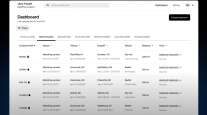Opinion: The Risks of ‘Rebrokering’
By Robert Voltmann
CEO
Transportation Intermediaries Association
This Opinion piece appears in the May 13 print edition of Transport Topics. Click here to subscribe today.
Carriers that seek the ability to “rebroker” freight without separate broker authority and bond will keep the door open to marketplace fraud and nonpayment. Worse still, the practice will expose carriers to the ever-increasing risk of liability for accidents they did not cause. Calling rebrokering “convenience interlining,” “subcontracting” or something else makes no difference; the practice will create problems for the industry.
A few things to keep in mind: Brokers did not want a bond; motor carriers wanted the bond increased. “Interlining” as defined in MAP-21, the new transportation law signed by President Obama last year, follows the definition established by the old Interstate Commerce Commission, which never allowed carriers to rebroker freight, by any name, without separate broker authority. Additionally, owning or operating a truck is not necessary to get motor carrier authority. The questions those seeking to allow carriers to rebroker freight without separate broker authority and bond should be answering are: Who is responsible for freight payments, carrier selection liability and cargo liability? Let’s look at each of these.
Brokers did not want an increase in the bond. The Transportation Intermediaries Association agreed to it as part of an overall agreement with American Trucking Associations and the Owner-Operator Independent Drivers Association. These organizations wanted the bond increased and new regulations on broker bond/trust companies to better protect their members. It is ironic, then, to have other carrier organizations arguing that they don’t want the bond increased.
Because owning or operating a truck is not necessary to obtain motor carrier authority, if brokerage is not defined as it is in MAP-21 — and applied to everyone involved — the status quo of fraud will continue.
If carriers are allowed to rebroker freight without separate broker authority and bond, this opens the door to those who seek to cheat carriers, get motor carrier authority, grab loads from load boards, get an advance, flip the loads to carriers and disappear. The performing carriers will be left unpaid. This is one of the things that TIA, ATA and OOIDA sought to prevent. The provisions in MAP-21 spell out responsibilities and protect all involved. We believe that whoever hires a truck is responsible for paying for that truck.
When carriers rebroker freight without separate broker authority and bond, they also open themselves up to vicarious and negligent hiring liability — without any protections associated with brokerage. Many lawsuits of the past few years have involved the selection of carriers that were later involved in accidents where people died or were injured.
Millions of dollars in settlements or damages were awarded by courts and juries in these cases. In many of them, tort lawyers tried to establish increased liability when the case involved a carrier hiring another carrier. But a trend also emerged limiting the exposure of properly licensed brokers that have well-defined carrier selection procedures in place. Why would carriers not want to avail themselves of these protections?
Carriers that rebroker freight — again without separate broker authority and bond — usually are held to retain full liability as the carrier for the cargo (even though they did not transport it), but they will likely have no insurance protection for the actions of the brokered truck. However, legitimately licensed and bonded brokers acting as such are exempt from cargo liability under the 1906 Carmack Amendment, which has evolved to provide a uniform system of liability for interstate motor carriers. Why would anyone risk their company to save a few dollars?
The old ICC never allowed carriers to rebroker freight without proper authority. The advocates for unlicensed rebrokerage argue that it has become commonplace (mainly due to lax enforcement). That’s why ATA, OOIDA and TIA sought to move regulations that were ignored by the Federal Motor Carrier Safety Administration into law. Every industry needs a minimum of rules. MAP-21 re-establishes the rules for transportation — and the new law applies them fairly and evenly.
The arguments put forward to allow carriers to rebroker without separate authority are misleading at best. The rebrokering advocates argue that the MAP-21 provisions will have a devastating effect on drayage operators and agricultural haulers. None of this is true. Drayage within commercial zones is, in fact, exempt from regulation. In addition, most drayage is conducted by owner-operators. Ag haulers are exempt from regulation as well. When the rebrokering advocates are pushed, they have to admit that they want to rebroker general commodities without separate broker authority and bond, despite all the risks those activities entail.
MAP-21 does not prohibit carriers from rebrokering freight to meet peak demands. The law just requires carriers to have separate broker authority and a bond and to indicate as much on shipping documents or a contract that they are operating under a broker’s license number issued by FMCSA. This must apply to all involved or no one.
Brokerage is not a hobby. It’s a profession with certain responsibilities, including protecting other people’s money. Most of the money touched by a broker, whether that broker is asset- or non-asset-based, belongs to other people. The MAP-21 provisions are not onerous, and they will stem a growing tide of shipper-specific bonds that could be a true burden for motor carriers and brokers.
The Transportation Intermediaries Association is the largest education, information and advocacy organization for third-party logistics professionals doing business in North America.


